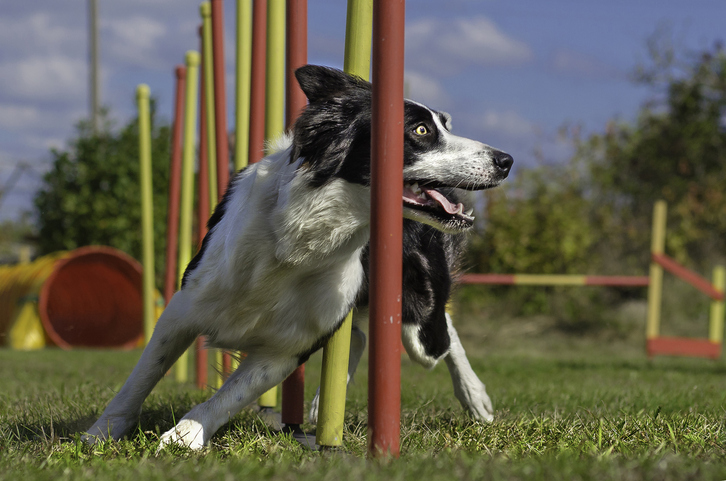Best dogs for anxiety and emotional support
24th February, 2022

If you've been watching the hit Netflix series After Life, you'll know that one of its biggest stars is a character that doesn't even get many lines – beyond the occasional bark.
Yes, viewers have fallen in love with Brandy, the beautiful German Shepherd who helps owner Tony (Ricky Gervais) through the process of grieving for his departed wife, Lisa.
Tony is struggling to come to terms with the loss of his beloved companion, and moves through different phases of depression, anger and cynicism. However, his loyal, faithful dog provides a huge source of solace and unconditional love (and a large cuddly pillow!) at the end of each difficult and emotional day.
The popularity of the show has drawn attention to the fact that dogs can be wonderful sources of emotional support, whether their owners are experiencing loneliness, anxiety, depression or a host of other related conditions.
Anxiety and depression are increasingly prevalent in humans, after all. Recent research from mental health charity Mind revealed that since March 2020, around one third of adults surveyed said their mental health has got much worse. On top of that, around 88% of young people said that loneliness made their mental health worse during the pandemic.
The good news is that some breeds of dog have just the right sort of personality to provide companionship to their human owners. These are dogs that, as well as displaying the unquestioning loyalty we have come to expect from all canine breeds, seem to have a genuine emotional intelligence. This intuition means they will stick by you, making themselves available for cuddles, walks and conversations whenever you need it. It even seems to allow them to understand your low moods, and to be there for you when you need them most.
Of course, the very act of caring for a dog is often, in itself, a huge source of mental and emotional support. The various responsibilities involved – feeding, grooming, walking – give us a sense of purpose, while the close, dependent relationship that dogs require fills a big emotional need for many people. Dogs often seem to be excellent listeners, too, sitting quietly beside you while you have a little down time.
Did you know that when we stroke or cuddle up with a dog, that physical closeness improves our mood, lowers our blood pressure, and keeps our stress and anxiety in check?
A recent study by the University of Toledo in the United States found genuine, empirical evidence to support the widely held belief that dogs and other 'emotional support animals' can provide quantifiable benefits to people suffering from depression, anxiety and loneliness.
Calm breeds with easy-going personalities are naturally suited as emotional support dogs. Elsewhere, dogs with that little extra emotional intelligence seem to be able to sense when you’re not at your best, giving you that extra dose of warm, furry affection that helps you on the road to recovery.
Whatever breed you decide on, make sure you support them with the right pet insurance for their age and needs. Let’s take a look at some of the best dogs for anxiety and emotional support.

Cavalier King Charles Spaniel
Cute, intelligent and highly sociable, Cavalier King Charles Spaniels are one of the breeds known as 'companion' dogs – animals that were bred for their engaging, sociable nature, rather than to work as hunting or farm dogs.
This breed certainly fits the role of companion well, very much enjoying the company of humans of any age. Kind, gentle and loyal, they are deservedly popular dogs, and appear to be one of the best dogs for anxiety sufferers.
Another string to the King Charles' bow is that their exercise needs are not huge, meaning that they will be as happy in a city flat as in a large country house surrounded by farmland.
They also have the adorable habit of curling up on their owner's lap for hours at a time. Indeed, it's believed that they were bred partly to keep royal laps warm in freezing cold castles or long chilly carriage rides!
They do need lots of company themselves, and will get upset at being left alone – but for anyone with time on their hands and a need for some unconditional love, they will make an ideal choice of pet.
Cavaliers like to please, and as a result they are relatively easy dogs to train. They'll respond particularly well to positive, reward-based training. It's also important to socialise and house train your Cavalier puppy from an early age. These dogs are prone to bark a fair amount, so might not be best suited to anyone who is anxious about loud noises.
Cavalier King Charles Spaniel health problems
Like any dog breed, and so-called 'purebreds' in particular, Cavaliers are prone to a few health problems. They are predisposed to heart conditions, usually caused by mitral valve disease – where the mitral valve weakens and doesn’t perform efficiently. Eye problems – including inherited problems such as cataracts – are also reasonably prevalent among Cavaliers.
Due to their long ears and short muzzles, Cavaliers are also at risk of problems with their ears and teeth. Given these and other health issues, we'd recommend owners take out some pet insurance from the very start of their ownership.
Labrador
Few dog breeds provide as much unquestioning love, loyalty and solace to their owners as the Labrador. For one thing, Labs have the ideal cheerful, laid-back temperament to be the solid, dependable rock in someone's life when things go wrong.
What's more, Labrador Retrievers are also extremely empathetic, able to pick up on just how their owners are feeling and to give them that extra bit of affection when required.
The fact that Labs famously love their food makes it easy to get a reward-based training programme going. With the prospect of a tasty treat on the horizon, Labs will quite quickly learn to perform helpful little tasks or supportive behaviours – such as lying down beside you, which can be very effective at reducing anxiety.
Labrador health problems
That love of food does mean that Labs are more at risk of obesity than many other breeds. However, with the right mix of exercise plans and changes to their diet, you can bring your Labrador back down to a safe weight. If you're seeking exercise inspiration, why not have a read of our piece on keeping your dog in good shape?
This breed is also somewhat prone to both hip and elbow dysplasia – a lack of rigidity in the hip and elbow joints respectively, which eventually leads to arthritis. However, if well managed, these conditions don't need to affect your dog's chances of a long and happy life by your side.
Poodle
A Poodle would make a good choice as a companion for someone wrestling with anxiety. The reason for this is that this breed is very intelligent and obedient – and, as a result, easy to train.
There are likely to be relatively few stressful episodes during the training of your Poodle. What's more, you won't need to fear any awkward encounters with other dogs and their owners, as poodles aren’t usually aggressive towards other dogs. They are also – although that lavish coat might suggest otherwise – not given to shedding much, so won’t present an obstacle to people who like to keep their home tidy.
That said, they do need daily grooming – an activity that you may find soothing and therapeutic. Grooming can really help to build the bond between you and your pet. Poodles also come in three sizes, so you can choose the size that will work for you, your home life and your exercise plans.
Poodle health problems
Health conditions that can affect Poodles include luxating patella, in which the kneecaps slip temporarily out of place. You can read more about this condition in our useful blog post on the subject.
In brief, though, treatment for this condition depends on its severity. For example, if it seems to limit itself to periodic limping episodes – every few weeks or so – patella luxation can sometimes be managed with a mix of physiotherapy and a tailored exercise regime.
However, if your dog is limping more regularly than this, or seems to be in some pain, surgery might be the best option. This tends to be expensive, so we'd recommend poodle owners take out some pet insurance to help with the costs.
Poodles are also at a slightly higher risk of cataracts than many other dog breeds. This manifests itself in a cloudy appearance to the eyes. For more information on how dogs see and what conditions can affect their eyesight, why not read our fascinating article, how do dogs see?
Border Collie
Shepherds have traditionally worked with Border Collies for a very good reason. These dogs are very intelligent, and easy to train up to doing just what their breed has done for centuries: herding sheep.
In fact, this intelligent, responsible nature extends well to domestic and family life. Collies have the kind of emotional intelligence that allows them to sense when all is not right with their human companions. Their kind-hearted nature also means they'll respond with some of the affection that you may be needing at that moment.
Border Collies make an ideal pet for active owners who are able to take them out on lots of fresh-air adventures. As such, if physical activity forms a big part of how you manage your anxiety or depression, a Border Collie could be the perfect companion. Not only will they bring intelligence and empathy, a Collie will also make sure you get off the sofa and out into the world every day!
Border Collie health problems
If you're a dog owner who feels that you could do with an extra challenge in your life, or you're looking for a way to meet new people, you might want to think about getting your Border Collie some agility training. You can read more about agility training in our blog post on the subject.
We'll just add the caution that Border Collies do have high energy levels and can occasionally err on the manic side. So we'd definitely recommend arranging some pet insurance, just in case they ever get themselves in any sticky situations.

Corgi
The Queen famously knows her dogs, so the fact that she has owned over 30 Corgis since her accession to the throne in 1952 is a pretty ringing endorsement for the breed.
She has made a good choice: Corgis are playful, good-natured and easy-going dogs – all characteristics that make them very good emotional support animals. For one thing, the combination of that playful temperament and their very particular physique makes them a delight to watch. Seeing a Corgi dashing about, with their short legs and rounded hindquarters, is likely to bring a smile to anyone's face. But you'll also find that, when they're all done with their exercise, they will make a very affectionate companion.
When it comes to choosing your Corgi, you have two options: the Pembroke Welsh Corgi as favoured by the Queen, or the closely related Cardigan Welsh Corgi. The Cardigan is slightly larger, with a bushy, fox-like tail. Both, though, are equally playful, high-spirited, intelligent, and affectionate. Originally bred as herding dogs, the instinct to protect their human is strong in Corgis.
Corgi health problems
These breeds are, like any other, at some risk of certain diseases. Conditions most prevalent among Corgis include intervertebral disc disease (slipped disc), in which problems develop with the discs that provide cushioning between the vertebrae, or back bones.
When one of the discs slips out of place it causes unwanted pressure on the spinal cord, resulting in pain, nerve problems and, sometimes, paralysis. Corgis are among a number of smaller dogs who are somewhat prone to the disease due to the shape of their spine.
Treatment varies from rest, painkillers and physiotherapy in mild cases, to surgery in more advanced episodes. Corgi owners will find it useful to have some pet insurance in place, in case surgery ever becomes necessary.
Maltese
With their diminutive size, silky white coat and big soulful eyes, few dogs look more cuddly and adorable than a Maltese. And that sheer fact of having such a lovely, cute ball of fluff by your side (and gazing up adoringly at you!) will provide a lot of happiness and solace all by itself.
This dog's charm doesn't stop with its looks, though. Maltese are also affectionate dogs, very happy to cosy up on their owner's lap, dispensing licks and snuggles at will. And when they're in a more vivacious mood, meanwhile, they can be a whole lot of fun. In short, we think a Maltese could be one of the very best emotional support dogs out there.
This breed doesn't require a lot of exercise, so if you want to spend most of your time snuggled up on the sofa rather than racing around the fields, this could be the dog for you. Their long, thick coats also require grooming, which can be a very calming and bonding exercise for dog and owner alike.
Maltese health problems
Like any other breed, Maltese can fall prey to a number of health conditions. For that reason, we would definitely recommend some pet insurance to owners of the breed.
Particular problems that can face Maltese include hydrocephalus – an abnormal buildup of cerebrospinal fluid in the ventricles of the brain. Dental problems are also not uncommon. Remember, if you are concerned about any symptoms your dog may be displaying, as a Purely Pets insurance holder you will have unlimited access to our 24-Hour Vet Helpline. Just call with any concerns, and our dedicated team of veterinary nurses will be on hand to help.
Pug
The Pug is perhaps the very definition of a lap dog – small, cute with soulful eyes, and keen to be at your side as much as possible, please. This mixture of attractiveness and unquestioning devotion makes them one of the best dogs for anxiety sufferers, as a few moments in the company of a Pug is likely to calm down most fears and worries.
In fact, Pugs don't just like being around their owners – they positively require it, and don't like being left alone for any stretch of time. So if you need to feel needed, a Pug will answer that need in spades! In fact, if they are subjected to a long time without any human contact, pugs will show signs of separation anxiety – such as whining, depression, and chewing the furniture.
Pug health problems
We should warn you that, although Pugs are wonderfully affectionate dogs with engaging personalities, they are unfortunately more vulnerable than most breeds to a range of health problems. Much of this is down to them being a so-called 'flat-faced' breed – which can make them prone to breathing difficulties.
These include brachycephalic obstructive airway syndrome, which can result in severe breathing problems. Their shallow eye sockets, which are partly responsible for those big, doe eyes, also place Pugs at risk from a range of eye problems, such as dry eye, eye infections, and corneal ulcers.
Lastly, Pug Dog Encephalitis is a breed-specific condition that results in seizures, blindness, and walking difficulties.
Their relatively long list of potential ailments makes Pugs particularly strong candidates for pet insurance. As a companion for anxiety sufferers, however, they are hard to beat.
Beagle
Handsome, intelligent and loyal, Beagles have quite a few characteristics that make them suitable emotional support dogs. For one thing, they are friendly and affectionate, and will enjoy being with you whatever you're up to. They're also extremely adaptable, and will fit in with most lifestyles, making them a suitable pet for a first-time dog owner.
Lastly, Beagles are active dogs who like quite a lot of exercise. So, if you find it helpful to combat anxiety, depression or loneliness with physical fitness, a Beagle would most definitely make a suitable companion on your journey. In fact, as we explored in our article on the best dogs for runners, jogging with your dog brings great results for both of you. Physical fitness and mental health will improve for you both, while your bond will only be deepened by these shared experiences together.
Beagle health problems
Beagles can suffer from epilepsy and hypothyroidism among other issues. As you set out on a busy, active life together, remember that there is always the possibility of an illness, injury or accident curtailing your pet's activities for a while. We'd recommend some dependable pet insurance to help with the costs of any medical procedures your furry friend might need to get them back on their feet again.

Are German Shepherd dogs good for emotional support?
Yes, if you want your very own pup like Brandy in After Life, German Shepherd dogs are great as emotional support dogs. Highly intelligent and trainable, they’ll love nothing better than learning new things with you. They are often chosen as herding or working dogs, like police dogs, as they are so eager to please their owners.
Sadly, they have a number of health problems to watch out for. Hip and elbow dysplasia, bloat and diabetes can all affect this beautiful breed.
Recognising clingy behaviour
If you’re thinking of buying a dog for emotional support, you’ll probably be spending lots of time with them. However, there will be times when you need to pop to the shops or out in an emergency when they’ll need to be left alone.
It’s important to recognise the signs of separation anxiety which all breeds can display if they’re separated from you for too long.
Check out our article on how to spot the signs of separation anxiety and see which clingy dogs are most likely to be affected by being left on their own.
Specialist pet insurance from Purely Pets
Here at Purely Pets, we are proud to provide specialist pet insurance with a range of benefits. These include:
- 24-Hour Vet Helpline
- Easy online access to your policy documents
- 15 different levels of cover available
- No upper age joining limit
Contact us today to arrange a quote for pet insurance.
Helpful Pages
Recent Posts
Pet Insurance Quote
- 98% claims paid *
- Claims paid directly to vets
- 24/7 vet video consultations
- Interest free monthly payments




